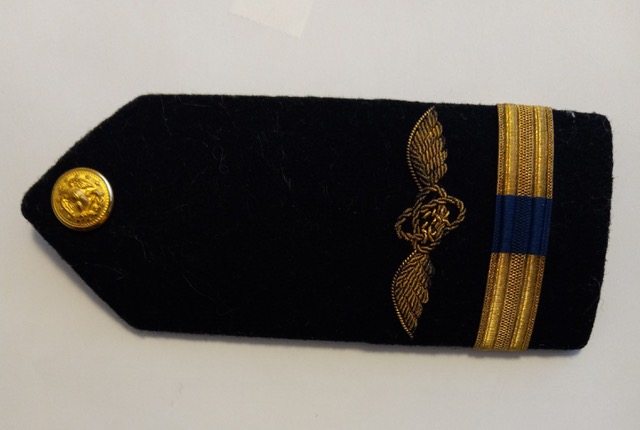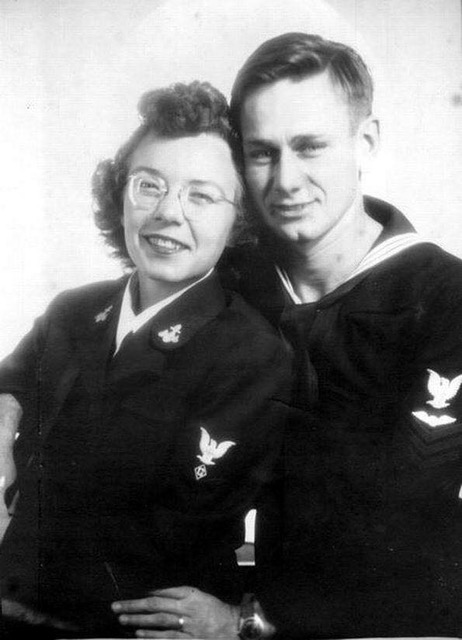You should have known my dad, Casey Baier. The tall, skinny guy from Cody, Wyoming, was no scholar. He made those gentleman Cs through high school but lettered in several sports. Grade-wise, he was a severe trial to his teachers, mainly because his sister Marie, his only sibling, had graduated four years earlier as class valedictorian. More than once, his teachers asked him, “You’re Marie Baier’s brother?”
But to think he was a dunce would be to err mightily. Dad was brilliant in other ways. He joined the U.S. Navy right before World War II as an able-bodied seaman, that lowly first rank. By the time he retired thirty years later, he wore Chief Warrant Officer shoulder straps with that aviation electronics symbol on them, the atom. Just consider that.
Any of you who read my books have caught something by now. I have written many novels about Royal Navy warrant officers. The U.S. Navy borrowed that ranking from the Royal Navy. It designates specialists. Because the RN had no aviation electronics (avionics) nerds in the early nineteenth century, I have focused on surgeons and sailing masters, who were warranted officers. Somehow, in some way, every book I wrote and write about them honors my dad.
If I recall rightly (my sisters can correct me), for a brief time, the U.S. Navy in my lifetime tried to do away with that rank. Didn’t work. These men – and I am certain women now – were needed for precisely what they knew and could do, plus they served as a bridge between enlisted and officers. These are the specialists who came up through the ranks and learn their trade with hands, hearts, and great minds. They probably understand enlisted personnel better than many Naval Academy graduates. Officers above them in rank, and there are many, defer to their knowledge.
Dad joined the Navy before WWII, specifically to become an electrician. They were in a group called “artificers.” He mainly served in the South Pacific, becoming one of the artificers who lit Henderson Field at Guadalcanal, taken from the Japanese who built it originally. His squadron also served sea duty. He volunteered to be a tail gunner on those sorties over the Solomon Islands and later Fiji. (Never told Grandma Baier about that until the war was over. Wise of him.)
He never talked much about the war. I squeezed a few details out of him much later, and so did my sisters. Like many others, he probably could have been awarded numerous medals. But that was war, and they fought as they could, not for recognition, but to do the job assigned to them. That tradition continues.
He met Mom in Florida near what is now called Cape Canaveral after he was assigned there in 1944. She was in gunnery training, and eventually became the first lady bombardier in the U.S. Navy. Mom was from Idaho. My younger sister told me that a friend of Mom’s introduced them, figuring that since they were from adjacent states, maybe they knew each other.
Mom was smart and hard-working, with a strong moral compass. Nice-looking lady, but no beauty. Many years later, before her funeral, he told us that he married Mom because he planned to stay in the Navy and knew that would mean involuntary separations through his career. He knew he wanted a wife he could trust implicitly, and a wife who could hold down the fort as well as he could. He loved her, yes. He also knew she would never fail him. She never did.
After the war, Dad ended up in rudimentary sub-chasing, done then from low-flying aircraft, using binoculars and early radar. Radar and Dad grew quickly more sophisticated through the years. By the time he retired, electronic surveillance was a science unto itself. There were times he couldn’t tell us what he did, and we always respected that. To this day, if someone tells me something in confidence, it goes no further.
What a wise man he was! My nephew Alok was an MIT graduate, as was his younger sister Sandhya. During one of his upperclassman years there, he complained to Dad that he got his first C ever in French. Dad, the man who understood C grades, told him, “Alok, all anyone is going to remember is that you graduated from MIT.” Yep. He was a cut-to-the-chase kind of guy.
He gave me great advice, too. Once he told me, “Never pack more than you can carry.” Think about that for a moment. Dad obviously played the long game.
My younger sister Wanda was a Marine Corps officer. She told me not too long ago that through the years, she met people who knew Casey Baier. “They always spoke of him with great respect,” she said. I have no doubt about that.
Dad could be remote. I think part of that came from a position of command. He could also be witty, hilarious at times, and a delight to know. Both of my parents expected that their three daughters would be college graduates, even though he wasn’t. We are, plus a few extra degrees, because our parents taught us the value of learning. Dad was always reading.
Yep, three daughters. I never once heard Dad complain about three daughters and no sons. I also never ever heard him speak ill of the Japanese, and we lived in Japan in the 1950s. He did tell me once that as he looked at it, they were warriors and so were the men and women of the U.S. Armed Forces. This has further informed my writing. Dad was tone deaf, or nearly so. Mom loved music. He attended all her concerts.
I’ve been accused by some of being the Unlikely Master Genius. Nope. Now you know who that really is, Kenneth Carl “Casey” Baier. Oh, and this: He was also a genius at backgammon, another popular game borrowed from Royal Navy adherents. It’s called Acey-Deucey in the U.S. Navy. Dad was known as Acey-Deucey Casey Baier. Again, that’s another long game accompanied by short spurts.
Hmm. I’d better have Able Six play some backgammon.

